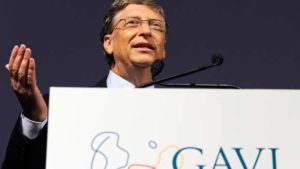
(CBS/AP) “For the first time in history, children in developing countries will receive the same vaccines against diarrhea and pneumonia as children in rich countries.”
That was the victorious message Bill Gates delivered after a global vaccine summit held in London, on June 13.
His foundation, the Bill & Melinda Gates Foundation, along with other international donors, pledged more than $4 billion to buy vaccines to protect millions of children from diseases like measles and yellow fever, in addition to pneumonia.
At the one-day conference, the foundation donated more than $1 billion to the cause. British Prime Minister David Cameron announced the U.K. would provide $1.3 billion of new funding through 2015, and Australia announced it would commit $211 million to the organization driving the initiative, the Global Alliance for Vaccines and Immunization (GAVI).
The alliance estimates that 2 million children die each year from vaccine-preventable diseases, so it buys injections for the world’s poorest countries to stop this trend.
“Today is an important moment in our collective commitment to protecting children in developing countries from disease,” Ellen Johnson Sirleaf, president of Liberia, said in a statement.
Health officials hope those pledge dollars will go towards vaccinating more than 250 million children, saving more than 4 million lives in the process.
But the initiative has its doubters.
Daniel Berman, a vaccines expert at Doctors Without Borders, said it was exciting so much money had been pledged towards saving lives. But he questioned whether the millions of taxpayer dollars would be spent properly.
“Why are we lining the pockets of big pharma like this?” Berman asked. “That just screams conflict of interest and corporate welfare to us.”
A 2009 study published in the journal “The Lancet” showed dozens of developing countries exaggerated figures on vaccination rates, allowing them to get more money from the alliance. Researchers said these countries immunized half as many children as they claimed.
Other experts warned that donating vaccines to countries with broken health systems might mean they just end up sitting in warehouses.
“We need to be mindful of the fact that investment in vaccines is not the magic answer to global health issues such as pneumonia and diarrhea,” said Sophie Harman, a public health expert at City University in London. “Without proper funding commitments to health infrastructure…any investment in vaccines will be redundant.”
The World Health Organization has more on vaccines.